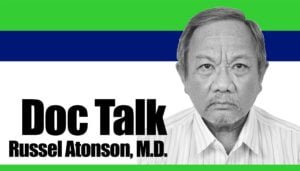“Almost 25 percent of premature deaths in the Philippines are attributed to hypertension and diseases related to it.” – Dr. Russel Atonson

There has been an increasing number of young people developing obesity and those suffering from heart attacks and strokes. Statistics show that 45 percent of Americans and 21 percent of Filipinos suffer from hypertension.
One out of six Filipinos are not even aware that they have the disease until it is too late. Almost 25 percent of premature deaths in the Philippines are attributed to hypertension and diseases related to it.
Hypertension, or HPN, or HTN, is also known as the “silent killer”. The disease is characterized by an elevated blood pressure above the normal of 120/80 mm, Hg. 139/89 is considered pre-hypertension and blood pressure above 140/90 is considered frank hypertension.
Blood pressure is the force exerted by the heart to push blood through the arteries of the body (systolic blood pressure) and the force of the blood as it circulates when the heart is at rest (diastolic blood pressure).
High blood pressure can occur without any identifiable cause. It is called essential hypertension. It may even be triggered by the presence of a doctor in a white coat in the clinic. It is labelled as white coat hypertension.
Hypertension can be hereditary. It may also come with age (common in people beyond 50) sex, race, kidney diseases, obesity, stress, anatomical defects of the large artery (aorta), heart diseases and sleep apnea.
Taking medicines (like NSAIDS, contraceptives, psychotropic and recreational drugs, anti-asthma drugs, cough and cold drugs, diet pills), diet high in salt content, smoking, alcohol intake and even pregnancy may also trigger hypertension.
Many people suspect they have hypertension if they experience some pain at the back of the neck. They may have learned about it by word of mouth. Other signs and symptoms include headache and/or dizziness with or without vomiting, blurring of vision or blindness, irritability, confusion or disorientation, easy fatigability, frequent nose bleeds or drowsiness.
When hypertension is undiagnosed and mismanaged or uncontrolled over a period of time, it can lead to strokes resulting in paralyses, chronic vegetative state or early death. Other outcomes include heart attack, kidney failure, blindness or altered states of consciousness.
Although we cannot change our genes (heredity, sex, race) nor push back our age, we can reduce the risks of developing hypertension through lifestyle changes such as cessation of smoking, avoiding alcoholic drinks, change of diet (low fat, low salt, high fiber and organic foods) and avoiding fastfood or junk food. It also helps to refrain from taking non-prescription drugs and do regular exercises (20 to 30 minutes three times a week) and remain active even when retired (gardening, carpentry as a hobby etc.). It is important to monitor our health status through periodic medical check-ups and following doctor’s advise.
Avoiding stress is another goal in reducing our vulnerability. It takes a lot of wisdom, creativity and instruction to reduce stress, especially during this period of pandemic when we are beset by frequent lockdowns, shifts in quarantine rules and isolation, when we lose our jobs and overthink about the possibility of being unemployed for an indefinite period, thus making it more difficult to look for money to buy food for our families, restrictions on travel and even being stranded in a strange place for a long time.
Inspite of all these uncertainties, we still need to pursue our treatment goals for hypertension to stop the progress of the disease, mitigate or aggressively treat the cause and avoid complications. With the help of our primary care doctors, regular check-ups, following doctor’s advice and faithful adherence to the drug regiment and with God’s help and guidance we will overcome! NWI



